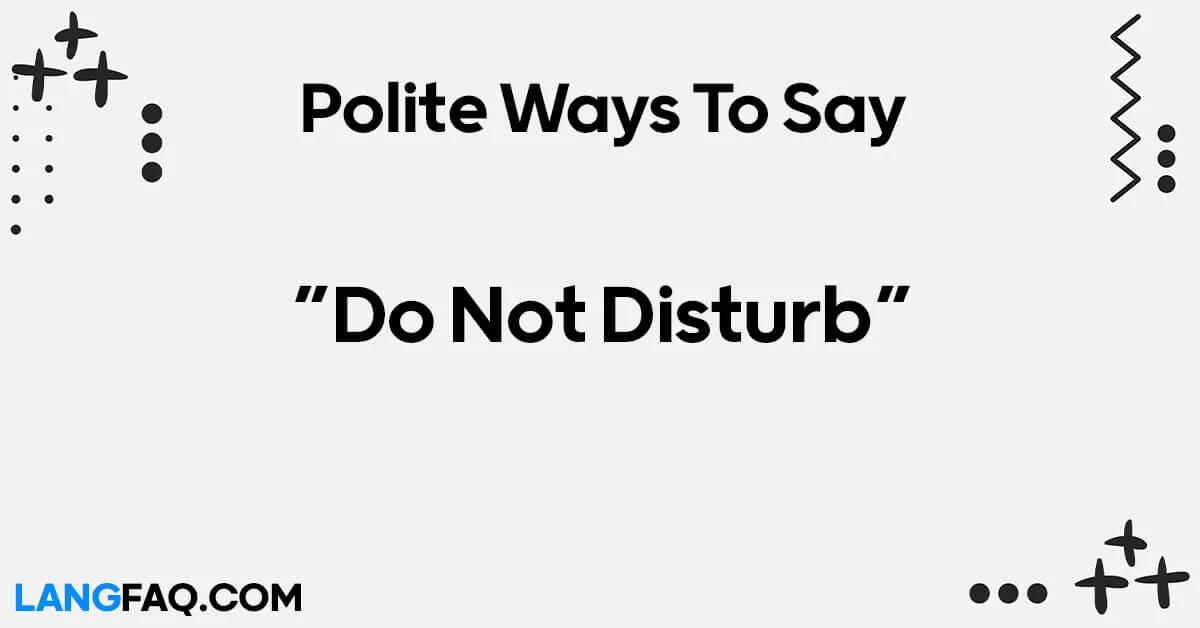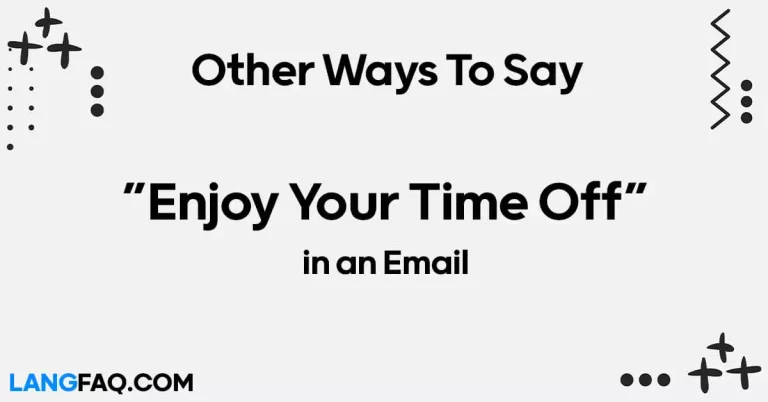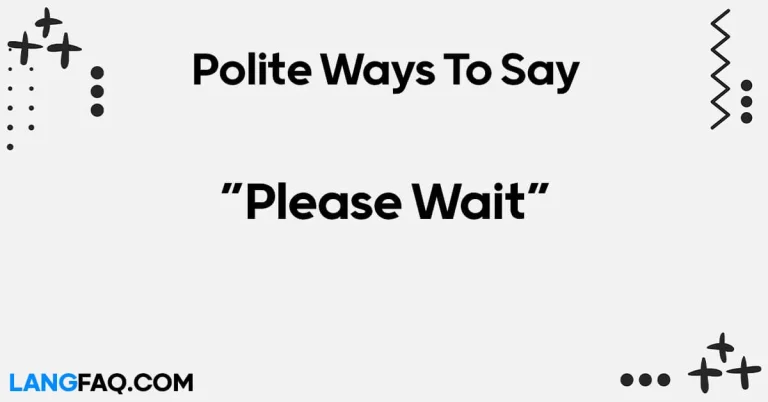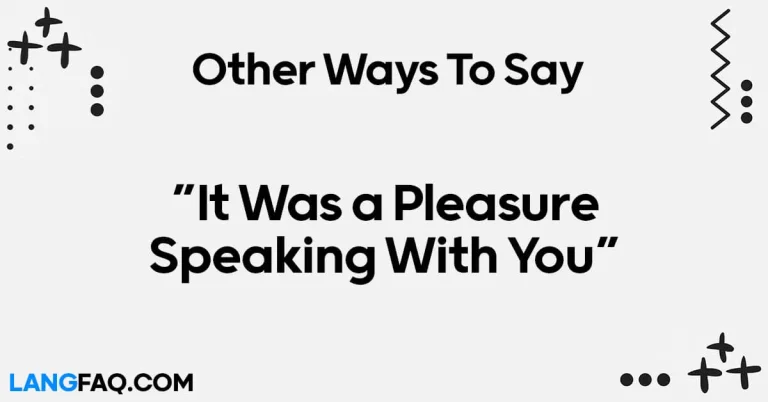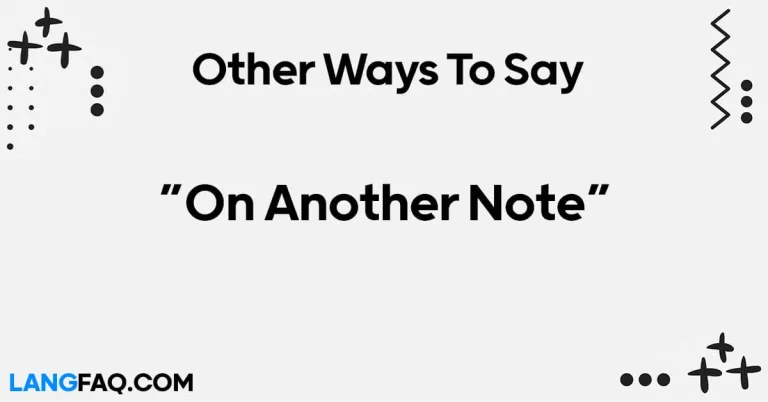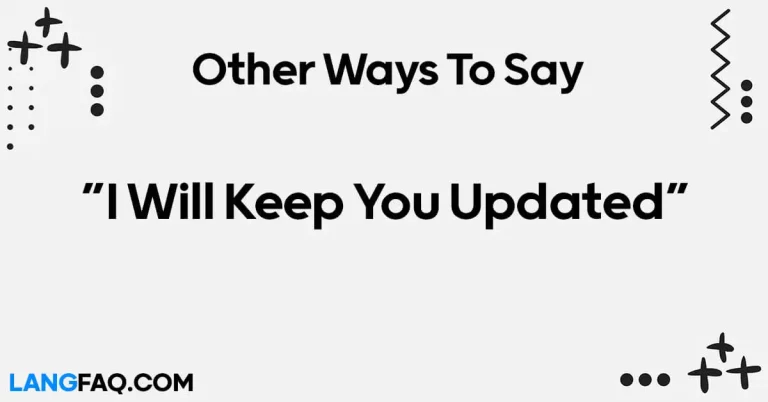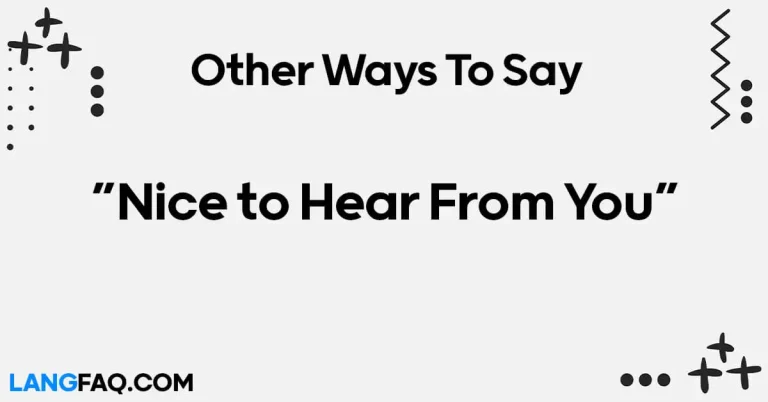In the hustle and bustle of the modern workplace, maintaining focus and productivity is crucial. One key aspect often overlooked is expressing the need for uninterrupted time politely. In this article, we delve into 12 polite ways to say “Do Not Disturb” at work, ensuring a harmonious and productive work environment.
12 Polite Ways to Say “Do Not Disturb”
Here are 12 polite ways to say “Do Not Disturb” in English:
- “I’m currently deep in concentration, can we catch up later?”
- “I appreciate your understanding; I need some focused time right now.”
- “I’m in the middle of a task; let’s connect when I’m finished.”
- “Could we chat during my break? I’m working on a tight deadline.”
- “Your respect for my quiet time is much appreciated; let’s talk afterwards.”
- “I need some uninterrupted time for a project; can we discuss this later?”
- “I’m in the zone right now; let’s schedule some time to talk about it.”
- “I value our conversations, but I’m on a tight schedule. Can we talk later?”
- “I’m focusing on a task; let’s find a time that works for both of us.”
- “I’m currently tied up with something important. Can we catch up soon?”
- “I’m on a deadline, but I’d love to discuss this with you later.”
- “I need a bit of quiet time for concentration; let’s connect when I’m free.”
Here’s a table with meanings and examples for the 12 polite ways to say “Do Not Disturb”:
| Polite Expression | Meaning | Example |
|---|---|---|
| “I’m currently deep in concentration…” | Expressing the need for focused work and requesting time. | “I’m currently deep in concentration; can we catch up later?” |
| “I appreciate your understanding…” | Acknowledging gratitude for respecting the need for focus. | “I appreciate your understanding; I need some focused time.” |
| “I’m in the middle of a task; let’s connect later.” | Communicating ongoing work and suggesting a future time. | “I’m in the middle of a task; let’s connect when I’m finished.” |
| “Could we chat during my break?…” | Suggesting an alternative time for conversation. | “Could we chat during my break? I’m working on a tight deadline.” |
| “Your respect for my quiet time is appreciated…” | Acknowledging and expressing gratitude for respect. | “Your respect for my quiet time is much appreciated; let’s talk later.” |
| “I need some uninterrupted time for a project…” | Clearly stating the need for uninterrupted focus. | “I need some uninterrupted time for a project; can we discuss this later?” |
| “I’m in the zone right now; let’s schedule…” | Indicating a state of deep focus and suggesting scheduling. | “I’m in the zone right now; let’s schedule some time to talk about it.” |
| “I value our conversations, but I’m on a tight schedule.” | Balancing appreciation and setting time constraints. | “I value our conversations, but I’m on a tight schedule. Can we talk later?” |
| “I’m focusing on a task; let’s find a time…” | Acknowledging the task at hand and proposing a future time. | “I’m focusing on a task; let’s find a time that works for both of us.” |
| “I’m currently tied up with something important…” | Indicating engagement in a crucial task. | “I’m currently tied up with something important. Can we catch up soon?” |
| “I’m on a deadline, but I’d love to discuss this later.” | Highlighting a specific deadline and suggesting a later talk. | “I’m on a deadline, but I’d love to discuss this with you later.” |
| “I need a bit of quiet time for concentration…” | Stating the need for quiet time and suggesting a later talk. | “I need a bit of quiet time for concentration; let’s connect when I’m free.” |
These 12 polite ways to say “Do Not Disturb” offer a versatile toolkit for effectively communicating the need for focused work or concentration. Whether expressing gratitude, proposing alternative times, or setting clear boundaries, these phrases provide considerate and diplomatic approaches to maintain a harmonious work environment. Tailor these expressions to suit specific situations and relationships, fostering understanding and cooperation among colleagues.
Is It Correct to Say “Do Not Disturb”?
Yes, “Do Not Disturb” is a correct and widely understood phrase in English. It is commonly used to indicate a desire for privacy or uninterrupted time. The phrase is often employed in various settings, such as on doorknobs in hotels, during important meetings, or when someone needs focused time in the workplace. It conveys a clear message that the individual prefers not to be disturbed or interrupted. Feel free to use this phrase when appropriate to communicate your need for solitude or concentration.
Professional Mail Example With “Do Not Disturb”
Subject: [Your Name] – Brief Unavailability for Focused Work
Dear [Recipient’s Name],
I trust this email finds you well. I wanted to inform you in advance that I will be dedicating some focused time to a critical project over the next few hours. During this period, I kindly request not to be disturbed unless it’s an urgent matter that requires immediate attention.
I appreciate your understanding and cooperation in respecting this need for uninterrupted work. If your inquiry is time-sensitive, please feel free to reach out to [Alternative Contact Person] during this timeframe.
I will be available and responsive after [specific time], and I look forward to addressing any queries or concerns at that point.
Thank you for your consideration.
Best regards,
[Your Full Name] [Your Position] [Your Company] [Contact Information]
1. Establishing Boundaries with “I’m currently deep in concentration; can we catch up later?”
In a professional setting, setting clear boundaries is crucial for maintaining focus and productivity. Using a phrase like “I’m currently deep in concentration; can we catch up later?” conveys the need for uninterrupted time without sounding dismissive.
Scenario: Imagine you’re working on an important report, and a colleague approaches for a casual chat. This phrase helps you express your current engagement without offending.
Example Sentence: “Hi [Colleague’s Name], I’m currently deep in concentration working on the quarterly report. Can we catch up later this afternoon to discuss your ideas?”
Email Sample:
Subject: Focused Work Time
Dear [Colleague’s Name],
I hope this email finds you well. I wanted to let you know that I’m currently deep in concentration working on the quarterly report. I appreciate your understanding, and if possible, could we catch up later this afternoon to discuss your ideas? Thank you for your consideration.
Best regards, [Your Full Name]
Variation for Colleagues: “Hey [Colleague’s Name], I’m knee-deep in this report. Can we chat during our break?”
Variation for Friends: “Hey [Friend’s Name], swamped with work right now. Let’s catch up over lunch?”
2. Acknowledging Gratitude with “I appreciate your understanding; I need some focused time right now.”
Expressing gratitude while communicating your need for focused time is a diplomatic way to maintain positive relationships in the workplace.
Scenario: During a team project, you find yourself needing concentrated effort. Acknowledging your colleagues’ understanding becomes crucial.
Example Sentence: “Thanks for checking in, [Colleague’s Name]. I appreciate your understanding; I need some focused time right now.”
Email Sample:
Subject: Needing Focused Time
Dear [Colleague’s Name],
I hope you’re doing well. Thank you for checking in. I appreciate your understanding; I need some focused time right now to meet our project deadline. If there’s anything urgent, please feel free to email, and I’ll get back to you at my earliest convenience.
Best regards, [Your Full Name]
Variation for Colleagues: “Thanks, [Colleague’s Name], I appreciate your support. Need some quiet time for a project.”
Variation for Mentor-Mentee: “Dear [Mentor’s Name], your guidance has been invaluable. I appreciate your understanding; I need some focused time for the tasks you assigned.”
3. Indicating Ongoing Work with “I’m in the middle of a task; let’s connect later.”
Acknowledging your current engagement is vital, especially when immersed in a task that demands your full attention.
Scenario: Picture yourself handling a critical task, and a team member wishes to discuss a non-urgent matter. Using this phrase politely conveys your current situation.
Example Sentence: “Hey [Team Member’s Name], I appreciate your input, but I’m in the middle of a task right now. Can we connect later?”
Email Sample:
Subject: Mid-Task Focus
Dear [Team Member’s Name],
Thank you for reaching out. I’m currently in the middle of a task that requires my full attention. Can we connect later this afternoon to discuss your thoughts? Your understanding is greatly appreciated.
Best regards, [Your Full Name]
Variation for Team Members: “Team, I’m in the thick of this project. Let’s schedule a meeting later for detailed discussions.”
Variation for Casual Discussions: “Hey [Friend’s Name], in the middle of something. Let’s catch up tonight?”
4. Suggesting an Alternative Time with “Could we chat during my break? I’m working on a tight deadline.”
When someone approaches you during a busy period, suggesting an alternative time shows your willingness to engage while respecting your current commitments.
Scenario: You’re working against a tight deadline, and a colleague wants to discuss a non-urgent matter. Proposing a break time for the chat is a considerate way to handle it.
Example Sentence: “Thanks for understanding, [Colleague’s Name]. Could we chat during my break? I’m working on a tight deadline right now.”
Email Sample:
Subject: Request for Break-Time Discussion
Dear [Colleague’s Name],
I hope you’re doing well. I appreciate your understanding. Could we chat during my break? I’m working on a tight deadline at the moment. Your flexibility is much appreciated.
Best regards, [Your Full Name]
Variation for Colleagues: “Team, thanks for your input. Let’s schedule a break-time meeting to discuss further.”
Variation for Friends: “Hey [Friend’s Name], tight deadline at work. Let’s catch up during my break?”
5. Expressing Appreciation with “Your respect for my quiet time is much appreciated; let’s talk later.”
Acknowledging and expressing gratitude for someone respecting your need for quiet time fosters positive communication in the workplace.
Scenario: You’ve made it clear that you need some quiet time to focus, and a colleague shows understanding. This phrase allows you to express gratitude and suggest a future conversation.
Example Sentence: “Thank you for respecting my need for quiet time, [Colleague’s Name]. Your understanding is much appreciated. Let’s talk later.”
Email Sample:
Subject: Appreciation for Respect
Dear [Colleague’s Name],
I wanted to express my gratitude. Your respect for my quiet time is much appreciated. Let’s schedule a time to discuss the matter further when it’s convenient for both of us.
Best regards, [Your Full Name]
Variation for Team: “Team, I appreciate everyone respecting my quiet time for focused work. Let’s plan a meeting later.”
Variation for Friends: “Hey [Friend’s Name], thanks for understanding. Let’s catch up this weekend?”
6. Clearly Stating the Need with “I need some uninterrupted time for a project; can we discuss this later?”
In certain situations, straightforward communication about your need for uninterrupted time is essential for effective collaboration.
Scenario: You’re engrossed in a project that requires intense focus, and a team member approaches for discussion. This phrase clearly communicates your current priority.
Example Sentence: “Hi [Team Member’s Name], I need some uninterrupted time for a project. Can we discuss this later when I’m available?”
Email Sample:
Subject: Need for Uninterrupted Time
Dear [Team Member’s Name],
I hope this email finds you well. I need some uninterrupted time for a project at the moment. Could we schedule a meeting later to go over the details? Your flexibility is appreciated.
Best regards, [Your Full Name]
Variation for Team Members: “Team, I’m knee-deep in this project. Can we set a meeting time for later today?”
Variation for Mentor-Mentee: “Dear [Mentor’s Name], I have a project demanding my full attention. Can we discuss this in our next mentoring session?”
7. Suggesting Scheduling with “I’m in the zone right now; let’s schedule some time to talk about it.”
When you find yourself in a highly productive state, indicating that you’re “in the zone” while proposing a future discussion shows consideration for the matter at hand.
Scenario: You’re deeply focused and productive, and a colleague wants to discuss a topic. This phrase allows you to acknowledge your current state and propose a scheduled meeting.
Example Sentence: “Hey [Colleague’s Name], I’m in the zone right now tackling tasks. Let’s schedule some time to talk about it when I can give it my full attention.”
Email Sample:
Subject: Proposal for Scheduled Meeting
Dear [Colleague’s Name],
I trust this message finds you well. I’m currently in the zone working on tasks that require my full attention. Let’s schedule some time to talk about [topic] when I can dedicate the focus it deserves.
Best regards, [Your Full Name]
Variation for Colleagues: “Team, I’m in the zone with our current project. Let’s arrange a meeting to discuss further details.”
Variation for Friends: “Hey [Friend’s Name], deep in work mode right now. Let’s plan a meet-up this weekend to catch up.”
8. Handling Casual Discussions with “Team, I’m in the thick of this project. Let’s schedule a meeting later for detailed discussions.”
In a team setting, especially during collaborative projects, letting your team know about your current engagement while proposing a later, more detailed discussion is considerate.
Scenario: You’re actively involved in a project, and your team wants to dive into detailed discussions. This phrase helps set expectations for a more focused meeting later.
Example Sentence: “Hey team, I’m in the thick of this project at the moment. Let’s schedule a meeting later for detailed discussions.”
Email Sample:
Subject: Schedule for Detailed Discussions
Dear Team,
I hope this email finds you in good spirits. Currently, I’m deeply engaged in our ongoing project. I propose we schedule a meeting later to delve into the details. Your flexibility in finding a suitable time is appreciated.
Best regards, [Your Full Name]
Variation for Casual Discussions: “Hey [Friend’s Name], in the middle of something. Let’s catch up tonight for detailed discussions.”
9. Proposing a Break-Time Discussion with “Thanks, [Colleague’s Name], I appreciate your support. Need some quiet time for a project.”
Acknowledging a colleague’s support while expressing the need for quiet time is a diplomatic way to handle interruptions, especially when working on a project that requires concentration.
Scenario: A colleague offers support, and you seize the opportunity to express gratitude while signaling your need for uninterrupted time.
Example Sentence: “Thanks, [Colleague’s Name], I appreciate your support. Need some quiet time for a project. Can we catch up during our break?”
Email Sample:
Subject: Appreciation for Support
Dear [Colleague’s Name],
I wanted to express my gratitude for your support on [topic/project]. It means a lot. I’m currently in need of some quiet time to focus on a project. Can we schedule a break-time catch-up to discuss further?
Best regards, [Your Full Name]
Variation for Team Members: “Team, your support has been invaluable. I’ll be working on a project and would appreciate some quiet time. Let’s plan a break-time meeting for updates.”
Variation for Friends: “Hey [Friend’s Name], thanks for having my back. Need some quiet time for a project. Let’s catch up during our break.”
10. Expressing Gratitude with “Your respect for my quiet time is much appreciated. Let’s talk later.”
In professional scenarios, expressing gratitude for the acknowledgment of your need for quiet time maintains a positive atmosphere.
Scenario: A colleague respects your need for quiet time, and this phrase allows you to convey appreciation while proposing a later discussion.
Example Sentence: “Your respect for my quiet time is much appreciated, [Colleague’s Name]. Let’s talk later when I’m more available.”
Email Sample:
Subject: Gratitude for Understanding
Dear [Colleague’s Name],
I hope this message finds you well. I wanted to express my gratitude for your respect for my quiet time. It means a lot. Let’s schedule a time to talk later when I can give it my full attention.
Best regards, [Your Full Name]
Variation for Team Members: “Team, your understanding of my need for quiet time is appreciated. Let’s plan a meeting later for in-depth discussions.”
Variation for Friends: “Hey [Friend’s Name], thanks for understanding. Let’s catch up later when I’m free.”
11. Acknowledging the Project’s Demand with “Team, I’m knee-deep in this project. Can we set a meeting time for later today?”
When deeply engrossed in a project, addressing your team and proposing a later meeting time demonstrates transparency and a commitment to providing your full attention.
Scenario: You’re heavily invested in a project, and your team seeks your input. This phrase helps convey your current commitment and proposes a suitable time for discussion.
Example Sentence: “Team, I’m knee-deep in this project at the moment. Can we set a meeting time for later today to discuss further details?”
Email Sample:
Subject: Meeting Request for Project Discussion
Dear Team,
I trust this email finds you well. Currently, I’m deeply involved in our ongoing project. I propose we set a meeting time later today to discuss the project in more detail. Your flexibility in scheduling is appreciated.
Best regards, [Your Full Name]
Variation for Casual Discussions: “Hey [Friend’s Name], swamped with this project. Can we chat later today?”
12. Expressing Focus on Tasks with “Hey [Friend’s Name], deep in work mode right now. Let’s plan a meet-up this weekend to catch up.”
When balancing professional and personal relationships, informing friends about your current focus on work while suggesting a future meeting maintains open communication.
Scenario: You’re caught up with work, and a friend proposes a spontaneous meetup. This phrase allows you to express your current focus and propose a future plan.
Example Sentence: “Hey [Friend’s Name], deep in work mode right now. Let’s plan a meet-up this weekend to catch up.”
Email Sample:
Subject: Weekend Meet-up Plan
Dear [Friend’s Name],
I hope this email finds you in good spirits. Currently, I’m deep in work mode. How about planning a meet-up this weekend to catch up? Looking forward to spending time together.
Best regards, [Your Full Name]
Variation for Casual Team Updates: “Team, I’m in work mode today. Let’s plan a casual team update tomorrow.”
FAQs
How can I communicate the need for focus without sounding rude? Clearly express your current workload, and use polite language, such as “I appreciate your understanding; let’s catch up later.”
Is it essential to inform colleagues about my focus hours? Yes, transparency fosters a collaborative environment. Share your schedule to minimize unexpected interruptions.
What if a colleague still interrupts despite my efforts? Address the issue privately, explaining the impact of interruptions on your productivity. Suggest alternative communication times.
Can humor be effective in conveying the “Do Not Disturb” message? Certainly! Humor can lighten the mood while clearly communicating your need for focused work time.
How can I diplomatically decline meetings during my focus hours? Politely decline, stating your commitment to focused work during those hours. Offer alternative meeting times that align with your schedule.
Should I adapt these methods for remote work situations? Absolutely. Remote work requires even clearer communication. Utilize virtual tools and ensure colleagues are aware of your availability.
Conclusion
Mastering the art of expressing “Do Not Disturb” at work is an invaluable skill. By incorporating these 12 polite methods, you not only enhance your productivity but also contribute to a positive and respectful work culture. Remember, effective communication is the key to a harmonious workplace.

